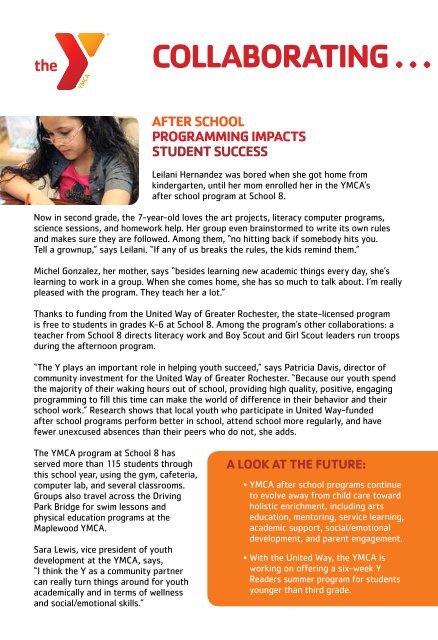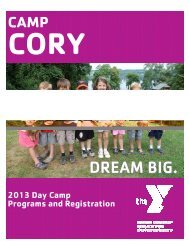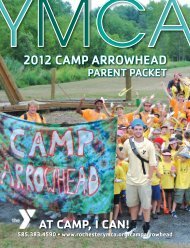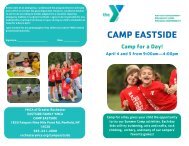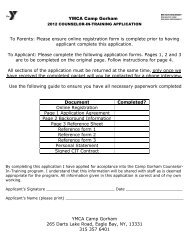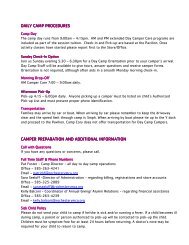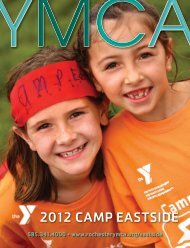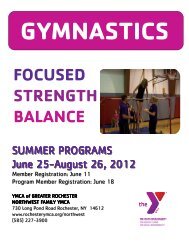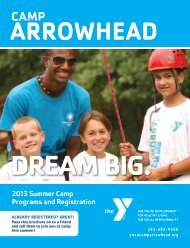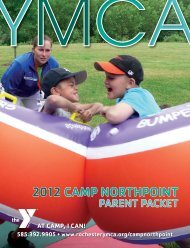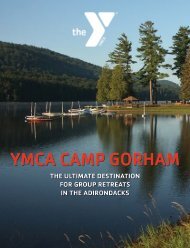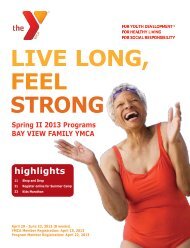2013 Annual Report--FINAL.pdf - YMCA of Greater Rochester
2013 Annual Report--FINAL.pdf - YMCA of Greater Rochester
2013 Annual Report--FINAL.pdf - YMCA of Greater Rochester
You also want an ePaper? Increase the reach of your titles
YUMPU automatically turns print PDFs into web optimized ePapers that Google loves.
Collaborating . . . To Develop Youth<br />
After school<br />
programming impacts<br />
student success<br />
Leilani Hernandez was bored when she got home from<br />
kindergarten, until her mom enrolled her in the <strong>YMCA</strong>’s<br />
after school program at School 8.<br />
“I’m really<br />
pleased with the<br />
program. They<br />
teach her a lot.”<br />
-Michel Gonzalez<br />
Now in second grade, the 7-year-old loves the art projects, literacy computer programs,<br />
science sessions, and homework help. Her group even brainstormed to write its own rules<br />
and makes sure they are followed. Among them, “no hitting back if somebody hits you.<br />
Tell a grownup,” says Leilani. “If any <strong>of</strong> us breaks the rules, the kids remind them.”<br />
Michel Gonzalez, her mother, says “besides learning new academic things every day, she’s<br />
learning to work in a group. When she comes home, she has so much to talk about. I’m really<br />
pleased with the program. They teach her a lot.”<br />
Thanks to funding from the United Way <strong>of</strong> <strong>Greater</strong> <strong>Rochester</strong>, the state-licensed program<br />
is free to students in grades K-6 at School 8. Among the program’s other collaborations: a<br />
teacher from School 8 directs literacy work and Boy Scout and Girl Scout leaders run troops<br />
during the afternoon program.<br />
“The Y plays an important role in helping youth succeed,” says Patricia Davis, director <strong>of</strong><br />
community investment for the United Way <strong>of</strong> <strong>Greater</strong> <strong>Rochester</strong>. “Because our youth spend<br />
the majority <strong>of</strong> their waking hours out <strong>of</strong> school, providing high quality, positive, engaging<br />
programming to fill this time can make the world <strong>of</strong> difference in their behavior and their<br />
school work.” Research shows that local youth who participate in United Way-funded<br />
after school programs perform better in school, attend school more regularly, and have<br />
fewer unexcused absences than their peers who do not, she adds.<br />
The <strong>YMCA</strong> program at School 8 has<br />
served more than 115 students through<br />
this school year, using the gym, cafeteria,<br />
computer lab, and several classrooms.<br />
Groups also travel across the Driving<br />
Park Bridge for swim lessons and<br />
physical education programs at the<br />
Maplewood <strong>YMCA</strong>.<br />
Sara Lewis, vice president <strong>of</strong> youth<br />
development at the <strong>YMCA</strong>, says,<br />
“I think the Y as a community partner<br />
can really turn things around for youth<br />
academically and in terms <strong>of</strong> wellness<br />
and social/emotional skills.”<br />
A look at the future:<br />
• <strong>YMCA</strong> after school programs continue<br />
to evolve away from child care toward<br />
holistic enrichment, including arts<br />
education, mentoring, service learning,<br />
academic support, social/emotional<br />
development, and parent engagement.<br />
• With the United Way, the <strong>YMCA</strong> is<br />
working on <strong>of</strong>fering a six-week Y<br />
Readers summer program for students<br />
younger than third grade.


